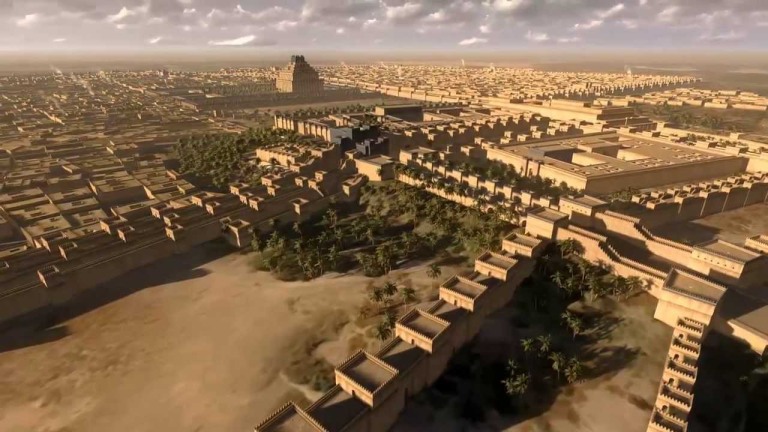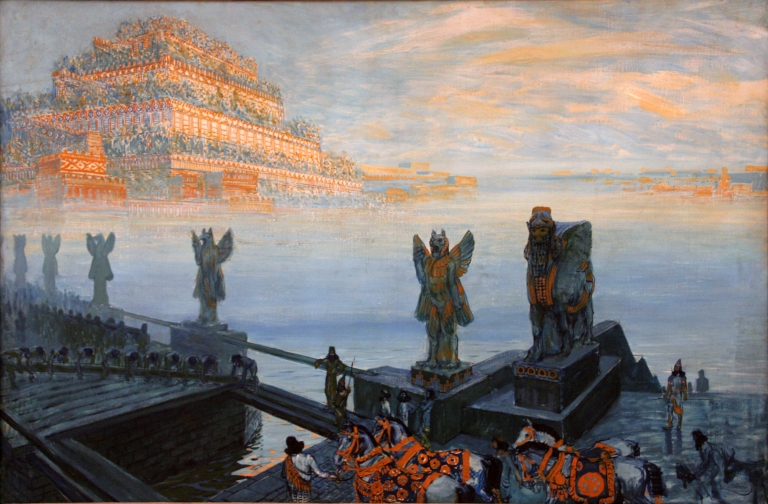
“Babylon” Frantisek Kupka
King Nebuchadnezzar destroyed Solomon’s temple in Jerusalem approximately five hundred and eight years before Christ. This was around eight hundred years after Joshua conquered the Promised Land. Hundreds of years of history pass – from the rule of the judges of Israel; to her first kings, Saul then David; Assyria becomes a world empire, and Babylon takes the world from Assyria – yet subsequently the covenant between the Lord and his people is undisturbed.
After the siege of Jerusalem, Nebuchadnezzar returned quickly to Babylon, taking precious vessels from the house of Jehovah Elohim. He brought them to the treasure stores of the great temple of his god Bel. This chief god of Babylon, Bel, was synonymous with the “Star god Saturn,” Bel Merodach, Marduke, Molech, and others, as we have shown through our study. All were the same god with slight differences in image and worship. The great temple of Bel was where the Babylonian army would bring the spoil and the treasures that they had acquired from the nations that they conquered.
His generals brought all the Hebrews that they had captured to Babylon, bringing Daniel and his companions along. According to Daniel chapter one, Nebuchadnezzar’s generals brought the children of Israel and chose from them those who were princes, without blemish, handsome in appearance, well educated, skillful in knowledge, and proficient in sciences. They were defined and polished so that they may be able to stand before the sovereign. They were the best of the captured Hebrews. They were the people of understanding who were cunning, and had the ability of learning.
“And the king appointed them a daily provision of the king’s meat, and of the wine which he drank: so nourishing them three years, that at the end thereof they might stand before the king.” The book of Daniel continues, “Now among these were of the children of Judah, Daniel, Hananiah, Mishael, and Azariah: Unto whom the pricne of the eunuchs gave names: for he gave unto Daniel the name of Belteshazzar, and to Hananiah, of Shadrach; and to Mishael, of Meshach; and to Azariah, of Abednego.” We will see that these Hebrews, who were chosen because of their potential to be trained and fashioned in the knowledge of Babylon, never ceased to worship Jehovah. They comply with Jehovah’s law, by even refusing to partake of the food of the king’s table.
Babylon supplied training in mathematics, anatomy, and astronomy. Daniel was no doubt trained in all these sciences. The ancient inscriptions show that there was a special palace school with elaborate arrangements for education. The word learning is sepher, meaning “book, literature, history, and records.” Babylon had huge libraries with books classified on all subjects which could be secured. There was a special department in the palace to train these promising aristocrats.
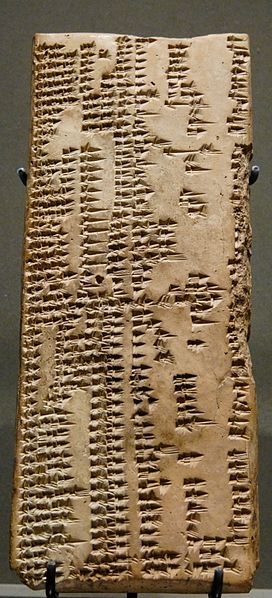
A Sumerian-Akkadian Lexicon, Volume 16 of a 24 volume encyclopedia from Uruk. It was compiled in the old Babylonian period from pre-existing texts, dating back to 3000 B.C.
Babylon had access to all the knowledge of Egypt. Many theologians call this period of history, “Neo Babylon.” We have studied the wealth of knowledge that dates back to Abraham and Chaldea after the flood. We have also seen the dark knowledge of certain arts given from fallen angels to their offspring. These titan princes were knowledgeable in all things necessary to build advanced edifices and ziggurats. We have traced the origins of advanced knowledge to the land of Shinar, east of the Euphrates. Nebuchadnezzar conquered Egypt and inherited the knowledge of both empires.
Daniel’s name means “God is Judge” in Hebrew. The Babylonians renamed him Belteshazzar, meaning “preserve thou O Bel his life” or ‘prince of Bel. Daniel did not like the name the Babylonians gave, and chose to continue to be called Daniel. For this named Belteshazzar related to the chief deity of Babylon, Bel Merodach or Bel.
Hananiah meaning “gift of the Lord” was renamed Shadrach, meaning “command of Aku,” the moon god. Again we see the lunar god which is directly linked to the “bull god” and related by the crescent moon – resembling the two horns. This is the personification of the devil, and the the instigator of the works of the flesh.
It was obvious that the great empire of Babylon was assimilating the cream of the crop from among the Hebrew princes. They were renaming them in hope of recruiting them for the benefit and the progress of their kingdom and their culture.
Mishael, whose name means “who is what God is,” was renamed Meshach – “who is as Aku.” Again we see the moon god referenced herein correlation with the bull god. Azariah, meaning “whom Jehovah helps” was renamed Abed-nego, “servant of Nego,” or Nebo: the god of science and literature. This is again related to the Babylonian deity. Giving different names to captives or foreign slaves was a sign of putting them under subjection, preparing them for a special and lengthy training course by the ruler of that kingdom.
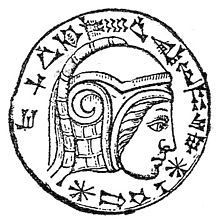
An engraving on an onyx stone rye from a Marduk that depicts Nebuchadnezzar and reads, “In honor of Merodach, his lord, Nebuchadnezzar, King of Babylon in his lifetime had this made.”
Daniel received favor from the Babylonians because he could interpret dreams, and the gifting of God was upon him. Daniel was exalted and promoted by the rulers. His righteous life contributed to the witness of Jehovah. Nebuchadnezzar dreamed a dream that his spirit was troubled. He could not go back to sleep that night. Nebuchadnezzar was a warrior, a soldier; he did acts that resembled the accomplishments of heroes. He was “god king” whose dominion extended all the way beyond the region of present day Iran, Iraq, Syria, Judea, Libya, and reached into Mauritania in Africa. This king built one of the most amazing empires on the planet. Yet, he could still not sleep because of a dream. He could not sleep because the dream was from Jehovah Elohim.
Nebuchadnezzar commanded all of his magicians, astrologers, sorcerers, and the Chaldeans to come and stand before him. Some of these men could speak in different dialects and were trained in all foretelling arts. The Chaldean spoke to the king of Syriac, and Aramaic type of dialect. He told the king to tell them the dream and that they would show him the interpretation.
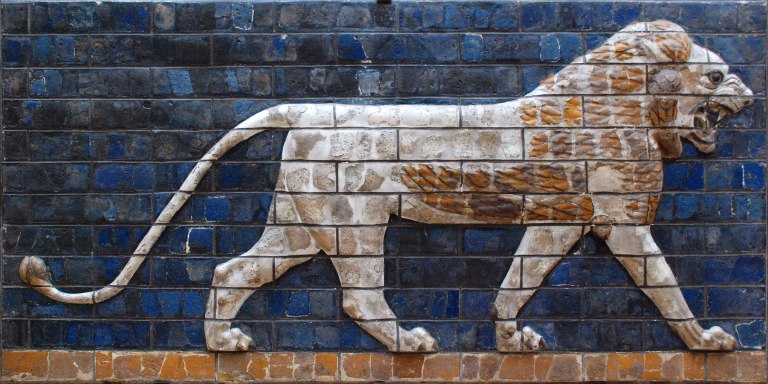
One of approximately 120 glazed brick walls of the processional way leading to the temple of Ishtar.
The king told the Chaldean that he wanted them to not only interpret the dream but he wanted them to tell him exactly what he dreamt. The magicians, astrologers, sorcerers, and the Chaldeans told Nebuchadnezzar that this has never happened before. They shared with the king that he was supposed to tell them the dream first and then they would interpret its meaning. The king was so angry that he shouted, “Cut them into pieces and make their houses as dung hills.” Daniel spoke boldly and asked the king for some time. He immediately went to his house and told Hannaniah, Mishael, and Asariah, his companions, the king’s demands. All the wise men in Babylon were going to perish if Daniel did not hear from the Lord.
Jehovah Elohim reveals the deep and secret things, He knows what is in the darkness and all light dwells in Him. Daniel gives thanks to God for wisdom and might because the Lord showed him the king’s dream. Daniel quickly returns to Nebuchadnessar and he says, “Thou, O king, sawest, and behold a great image. This great image, whose brightness was excellent, stood before thee; and the form thereof was terrible. This image’s head was of fine gold, his breast and his arms of silver, his belly and his thighs of brass, His legs of iron, his feet part of iron and part of clay. Thou sawest till that a stone was cut out without hands, which smote the image upon his feet that were of iron and clay, and break them to pieces. Then was the iron, the clay, the brass, the silver, and the gold, broken to pieces together, and became like the chaff of the summer threshingfloors; and the wind carried them away, that no place was found for them: and the stone that smote the image became a great mountain, and filled the whole earth.”
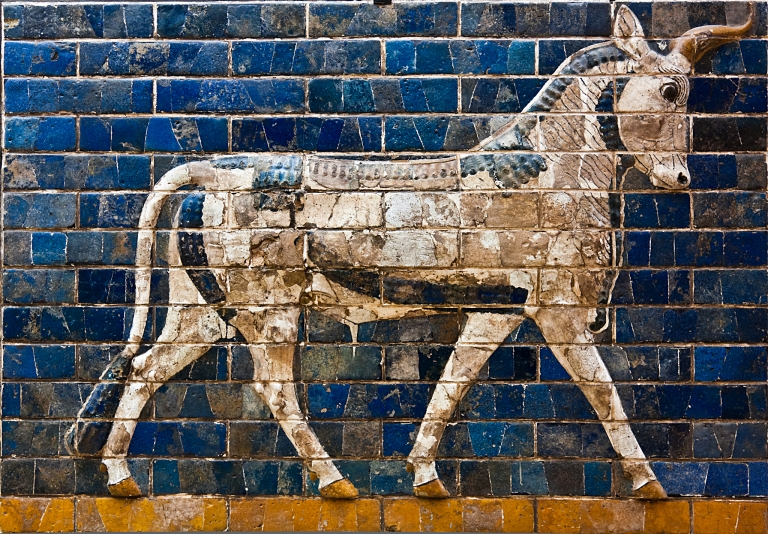
One of the glazed brick bulls on the Ishtar gate itself, an enormous blue arching doorway covered in brick inlays of dragons, and bulls.
Daniel interpreted the dream and first tells Nebuchadnezzar, “Thou, O king, art a king of kings: for the God of heaven hath given thee a kingdom, power, and strength and glory.” He said, You are the head of gold. You are the pure Babylonian government. You are allowed by God to rule “wheresoever the children of men dwell, the beasts of the field and the fowls of the heaven hath he given into thine hand, and hath made thee ruler over them all. Thou art this head of gold.”
Daniel explained that after you there is going to come the shoulders, and they are going to be made out of silver. The next government will be inferior to yours. The one after that will be made out of brass and shall rule over all the earth. And the fourth kingdom will be as strong as iron. The iron will break in pieces and subdue all things. And where you saw the feet and toes were part iron and part clay, so will the kingdom be partly strong and partly broken. When you saw the iron mix with the miry clay, they will mingle themselves with the seed of men; but they will not cleave one to another, even as iron is not mixed with clay.”
“And in the days of these kings shall the God of heaven set up a kingdom, which shall never be destroyed: and the kingdom shall not be left to other people, but it shall break in pieces and consume all these kingdoms, and it shall stand forever,” as recorded in the book of Daniel.
Then the king Nebuchadnezzar fell on the ground and worshipped Daniel, and said, “Of a truth it is, that your God is a God of gods, and a Lord of kings, and a revealer of secrets, seeing thou couldest reveal this secret. Then the king made Daniel a great man, and gave him many great gifts, and made him ruler over the whole province of Babylon, and a chief of the governors over all the wise men of Babylon” Daniel requested the help of Shadrach, Meshach, and Abednego, and they were appointed over the affairs of the province of Babylon. The lives of all the wise men were spared.
Josephus records, “Nebuchadnezzar erected elevated places for walking, of stone, and made it resemble mountains, and built it that it might be planted with all sorts of trees. He also erected what was called a pensile paradise, because his wife was desirous to have things like her own country, she having been bred up in the palaces of Media.”

The partially reconstructed ruins of Babylon.
Megasthenes, also, in his fourth book of his Accounts of India, mentions of these things, and thereby endeavors to show that this, King Nebuchadnezzar, exceeded Hercules in fortitude, and in the greatness of his actions; for he saith that he conquered a great part of Libya and Iberia.
Also Diocles, in the second book of his Accounts of Persia, mentions this ruler; as does Philostrates, in his Accounts both of India and of Phoenicia, saying that his monarch besieged Tyre thirteen years, while at the same time Ethbaal reigned at Tyre. Josephus also mentioned that King Nebuchadnezzar’s son who succeeded him was called Evil-Merodach. From this record in Josephus, it seems factual that King Nebuchadnezzar was a man of extraordinary or supernatural achievements. He must have been an avid follower and worshipper of Bel-Merodach, the Babylonian god. His son’s name was Evil-Merodach. It is very possible that he had procured the supernatural aid of the dark prince to empower the kingdom of Babylon. It is also probable that this king was supernaturally driven to accomplish such feats – feats that would gain him mention in antiquities, as exceeding Hercules in accomplishments.
We must remember that it was not abnormal for kings and monarchs to be named interchangeable with the god that they served. This would unite them with that god so that they could be considered to be “god himself.”
This Nebuchadnezzar built an image of gold. This image was made out of pure gold and seemed to be at least one hundred and twenty-feet high and twelve and one half foot wide. It is impossible to know the certainty of the nature of this image. His shape and form is unknown, but it was common practice in Assyria, Babylon, Egypt for the Pharaoh, the King, and the Monarch to be regarded as a god.
It is possible, considering Nebuchadnezzar’s worldwide reputation and the accomplishments and the achievements that we see attributed to him through historians in antiquity, that this image may have been either a golden image of the king himself, or a form that conjoined or mingled the king and Nebu, the god of Babylon.
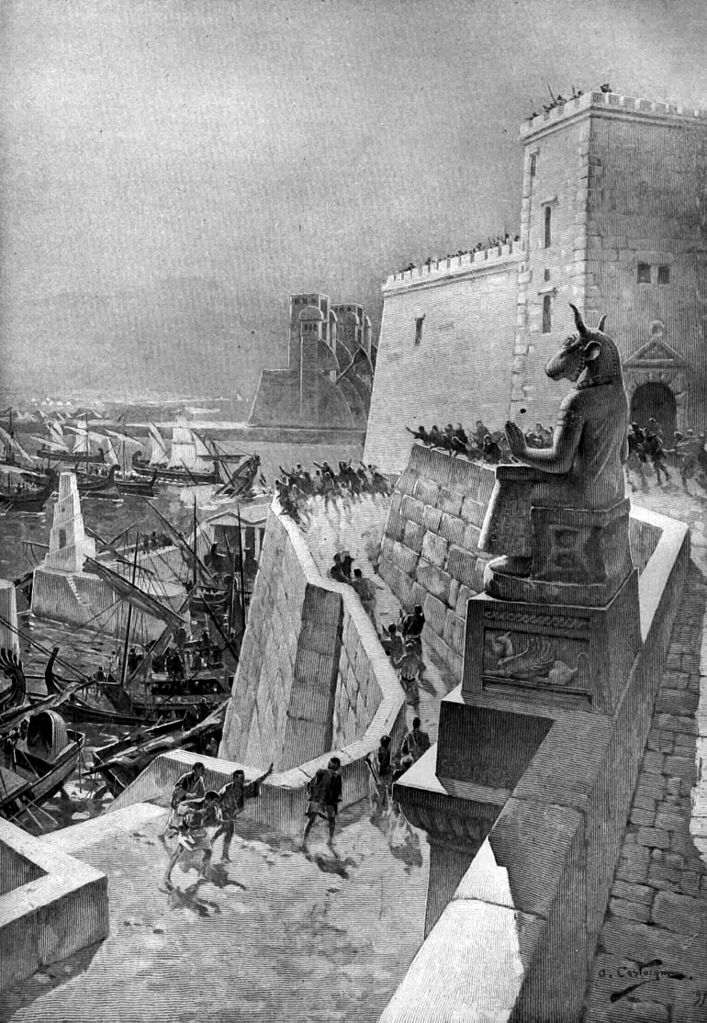
“A Naval Action During the Siege of Tyre” by Andre Castaigne
It is also important to recognize that treasures and wealth are intricately involved in any form of worship. Imagine a statue and image molten and graven; made of pure gold; one hundred twenty-five foot high, and twelve and one half foot wide; erected specifically for the purpose of inciting an entire population to exercise worship. This statue represented the wealth of an empire, the status of a king, the power of a god, and the attention of the people.
Worship and “things of worth” always go together. Jehovah Elohim is the Provider the Supplier. He is the Multiplier, and the Nourisher of His people. When we worship Him with our talent, our treasures, our abilities and strengths that He gives to us; He in turn, releases His help and His power, to promote, help, and bless us. It is His will that we occupy the land that He has promised us and that we keep the victory that is given to us. Jehovah Elohim wants us to always be willing and obedient so that we can eat of the good of the land.
This image that King Nebuchadnezzar made was put in a certain plain called Dura in the province of Babylon. He also informed princes, governors, captains, judges, treasures, counselors, sheriffs, and rulers of the provinces to come and be part of the initiation. King Nebuchadnezzar wanted the acknowledgement of his imposing image to cause all people to worship together in the obedience that he felt belonged to this golden god.
King Nebuchadnezzar informed those in charge of the treasure houses! Notice again the involvement of the wealth of the empire in the acknowledgement of a particular religious system. I believe that as we study and meditate on the revelations revealed in this book, we will see the prince of darkness and his strategies exposed; his covetous, tyrannical methods always crave the wealth and the worship of people. As we see this truth brought to light, our worship to the Lord will be free to include our finances. We will be able to participate in the greatest transference of wealth the world has ever known – even at a time when nations, kingdoms and global economies are in the midst of turbulent crisis.
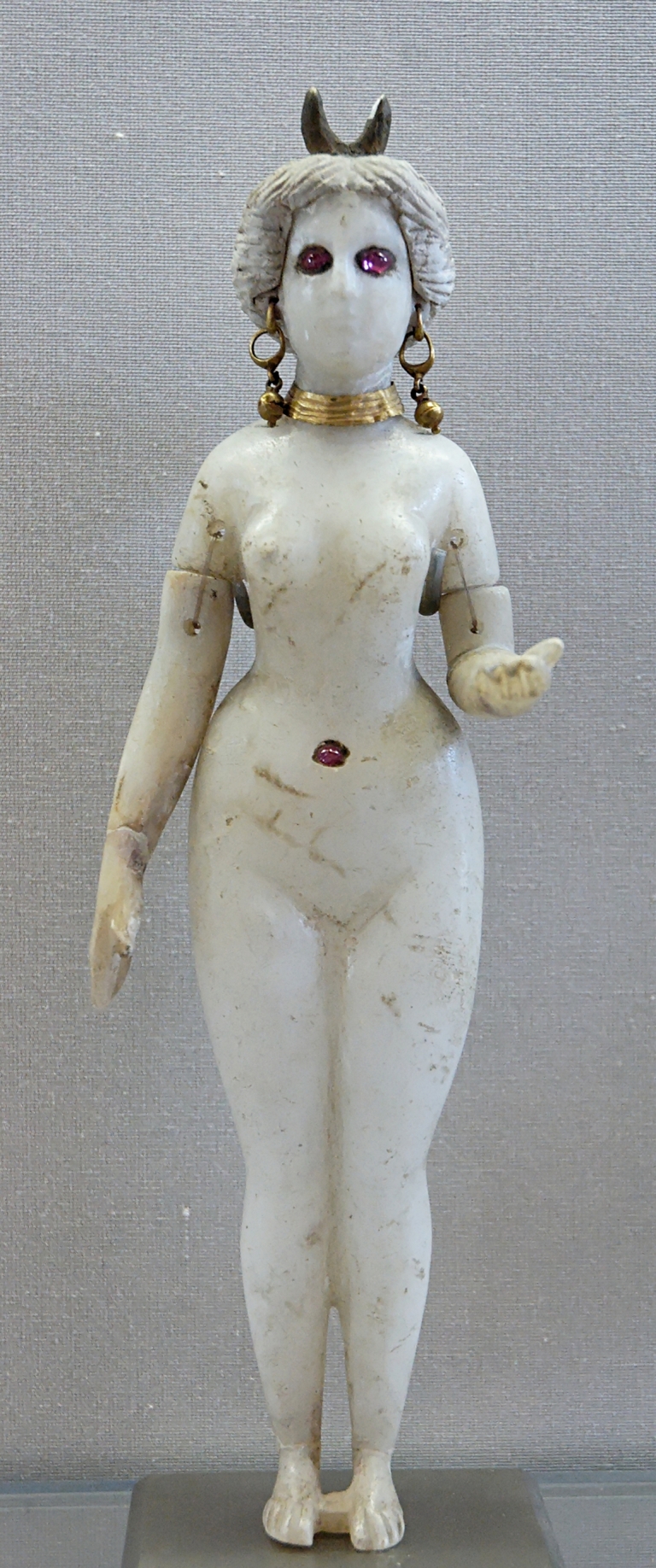
A horned Babylonian statue of Ishtar, also known as Astarte and Ashtoreth (the two horned)
This is a super power. Babylon at this time represented a one world government, the single foremost world power, uniting the religion, the ruler, and the wealth, in one solid union. This brawn is backed up by the power of military forces that will stop at nothing to prove the supremacy and potency of their form of government.
King Nebuchadnezzar also invited the rulers of counselors who were law givers and judges and supreme masters and magistrates, called sheriffs; state and civil officers; and various wise men. It is important to know that they were heralded and introduced to represent every branch and every aspect of Nebuchadnezzar’s kingdom and society. They were to participate in this great and historic time of worship as they acknowledge this golden image.
Music was to be played: a deep horn with a hollow sound was to be implemented a wind instrument with a strong sound, and other various musical pieces. Drums were also to be used. As they released the music, everyone who heard it was commanded to bow and to pay homage to this golden image.
Behind the scenes, those of us who understand spiritual matters know that Bel, the god of Babylon, is a dark spiritual force, not a golden statue or an image. He is spiritual force, a principality; as proven to us in the recorded conversations between Daniel and the angel or the Lord. The battle that was waged over Daniel’s prayer was fought between the Prince of Persia, Gabriel and Michael. These are the angels waging war with principalities and powers.
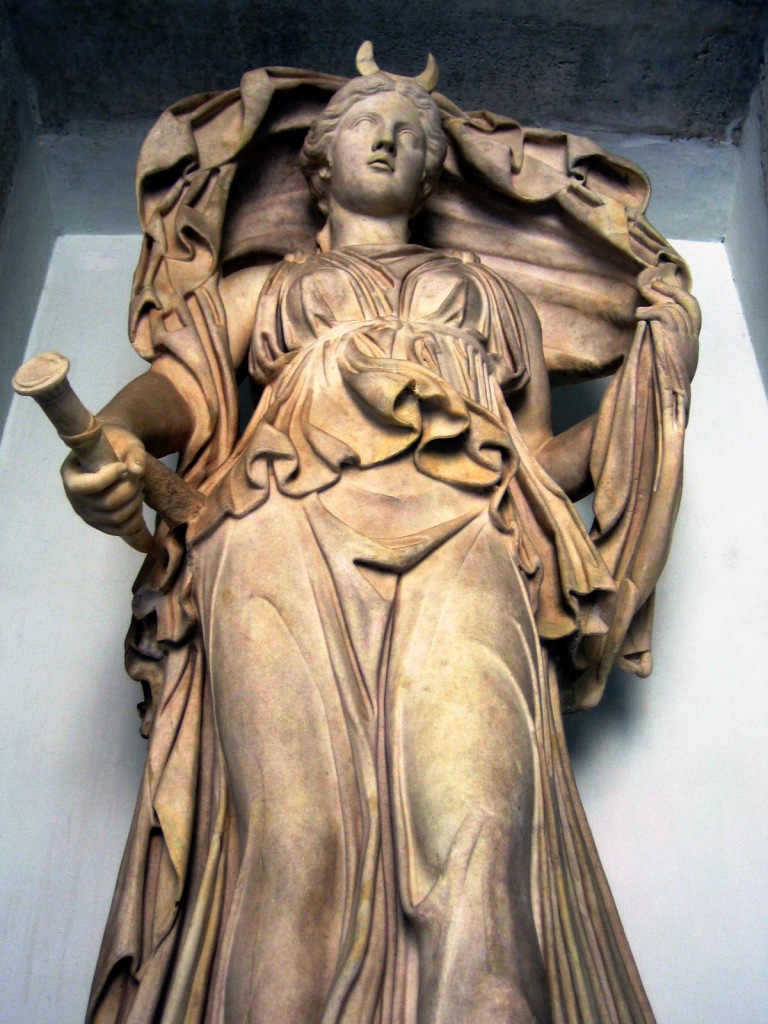
Selene, the Greek goddess of the moon, depicted here with the moon on her head as horns
According to the book of Ephesians, “For we wrestle not against flesh and blood, but against principalities, against powers, against the rulers of the darkness of this world, against spiritual wickedness in high places.” When we acknowledge the empowerment of Nebuchadnezzar’s golden statue, we must recognize that as the music was released, a tremendous demonic spiritual force was pressed upon the mind, and the emotions of the people, virtually compelling them to bow. These people represented the conquered nations that Nebuchadnezzar’s Babylon had overthrown and subjugated. There must have been a spiritual force that drove and compelled them to sense that this statue indeed represented a superhuman power. There was a dark spiritual force that drove them to obey the commands of the king.
Nebuchadnezzar believed he was the incarnation of Nimrod. By this time Nimrod has been deified as a hero hunter. His symbol was a man lion or a human-headed lion with eagle’s wings, named Nergal. He was an Assyrian deity entitled “God of the Battles,” or “God of chase.” In dynastic times, as we know, Pharaoh could be represented as a lion or a bull with the face of a man. Nebuchadnezzar was enchanted by images of both. Adremelch of Assyria was identical with Molech with the body of a man and a head of a calf. Bulls with the face of this obsessed monarch covered the gates of Babylon, appearing as human headed winged bulls carved in stone.
Human sacrifice was conducted to this god as we discovered earlier. Also, the Sphinx of Egypt had the face of the Pharaoh, and the body of a lion. Nebuchadnezzar had conquered Egypt. These images represent both the power of Bel, the god of Babylon, as well as maintain the deity of the king himself. These human headed winged bulls were stationed on the gates, on the walls of temples all over Babylon to guard the empire and to represent the power of their god and the unquestionable rule of their Nebuchadnezzar.
The command to bow down to the golden image was proclaimed to all. Princes, governors, captains, judges, treasures, counselors, sheriffs, and rulers of provinces all came to the dedication and bowed at the sound of the musical blast.
However, the three Hebrew children would not bow, nor would they worship the gods of the king. They were immediately accursed that they gave no regard to the king, and that they did not serve his gods and did not worship the golden image.
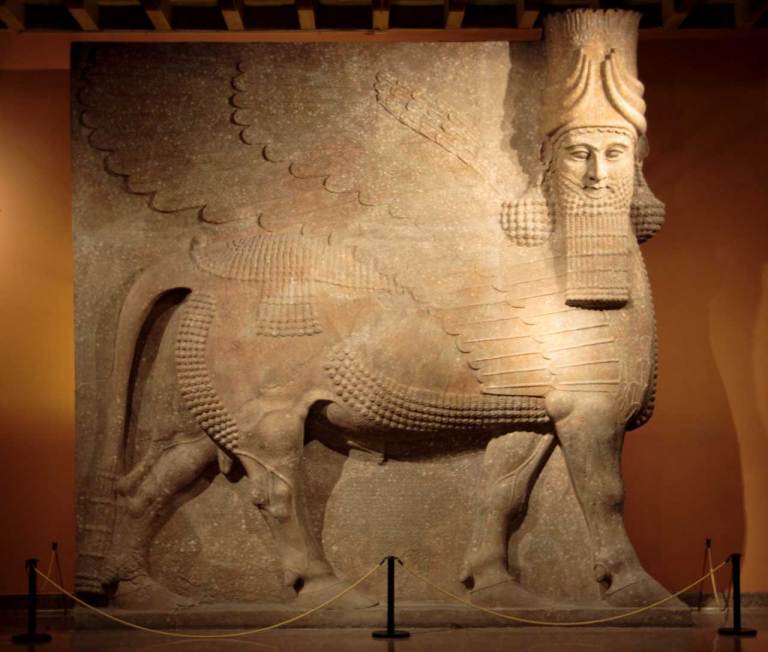
One of the two statues flanking the entrance to the throne room of King Sargon II, it depicts a creature with the winged body of a bull and the head of a man.
“There are certain Jews whom thou hast set over the affairs of the province of Babylon, Shadrach, Meshach, and Abednego; these men, O king, not regarded thee: they serve not thy gods, nor worship the golden image which thou hast set up,” as recorded in the book of Daniel. Because of their defiance to the king and their allegiance to Jehovah, they would have to be punished. However, the Bible says, “I am the LORD thy God, which have brought thee out of the land of Egypt, out of the house of bondage. Thou shalt have no other gods before me. Thou shalt not make unto thee any graven image, or any likeness of anything that is in heaven above, or that is in the earth beneath, or that is in the water under the earth. Thou shalt not bow down thyself to them, nor serve them: for I the LORD thy God am a jealous God, visiting the iniquity of the fathers upon the children unto the third and fourth generation of them that hate me.”
The children of Israel, Shadrach, Meshach, and Abednego, were in direct obedience to the word of God recorded in the law of Moses. God acknowledges or identifies Himself as the Lord our God, and He declares that we should not have any other gods before Him. This is referred to in the Pentateuch many times because of the consequence of this particular sin.
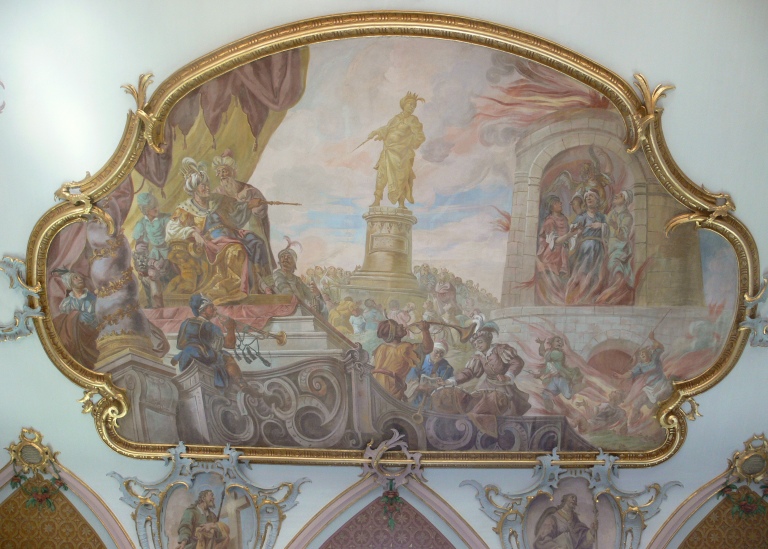
A painting depicting the three Hebrew children unharmed within the fiery furnace, by Franz Joseph Hermann
Jehovah Elohim gave the law to Moses to protect the children of Israel and all who believe from falling into prey to deception from pretentious devils. The Lord further said that the human race should never make any graven image to worship. The word is pesel, meaning to “hew, engrave, or sculpture.” This command forbids making any kind of idol, and prohibits every kind of idolatry.
Of course God is not against creativity; He is the Creator of all. Look at the sky or a beautiful flower, and you will see God’s love. Worship is another matter. The fallen angel – the dark prince – covets the worship of people. So he commanded that there shall be no graven image made in any likeness of the things in heaven above, the earth beneath, or under the earth.
So the Hebrew children, Shadrach, Meshach and Abednego would not defy the Lord and were sentenced to death in the fiery furnace. Because of the fury of the king, the furnace was heated seven times hotter than before. Tradition says that the flames reached over hundred feet high. There three Hebrews were not merely thrown into the furnace; they were dressed in flammable clothing which would make them burn faster and longer. They were to be made an example of the kind of judgment that would befall anyone would dare to disregard the king. The Babylonians wore a tunic of linen reaching down to their feet, with a woolen tunic over that, and a white short cloak. They also wore turbans on their heads and all of these clothes were extremely flammable.
The violence of the flame should have slain them; however, it slew the men that threw them in. The Hebrews fell down as they were bound in the midst of the fiery furnace. In the Song of the Three Holy Children in the Apocrypha, it is stated that the servants of Nebuchadnezzar kept throwing rosin, pitch, tow, and small kindling wood to feed the furnace to strengthen the flames. However, there was an intervention by a superhuman being. According to the book of Daniel, “Then Nebuchadnezzar the king was astonished, and rose up in haste, and spake, and said unto his counselors, Did not we cast three men bound into the midst of the fire? They answered and said unto the king, True, O king. He answered and said, Lo, I see four men loose, walking in the midst of the fire, and they have no hurt; and the form of the fourth is like the Son of God.”
This was an astonishing sight that took place in the presence of a mighty monarch, whose deeds and acts of supreme rule were thought to have exceeded those of Hercules. He was certain that such a hot flame would instantly slay these three bound, powerless Hebrew children. He was certain that his gods, that had empowered the Babylonian Empire, would become the superpower of a one world government. Nebuchadnezzar had no doubt that these flames would be no more than enough to overcome the Hebrews who were in allegiance and chose to worship Jehovah God.
The three Hebrews had claimed to serve the “True and Living God.” Their bodies were immune to the fire and not even a hair on their head was burnt. Their garments were not burnt and they did not smell like smoke. Nebuchadnezzar knew that he had seen “the Son of God.” He had never seen such preserving power. He was not ignorant of supernatural works or supernatural apparitions. His entire Kingdom depended on his gods, and now he saw “One” more powerful than any other. The Hebrew children confessed that God had sent His angel. God delivers those who trust Him.
The angels of God were known to appear to kings, pharaohs, and monarchs during their history. These fables and legions were passed down generation to generation by word of mouth and later by written words. Nebuchadnezzar believed Nergal was a god. He believed Bel Merodach was a god. He believed himself to be a god.
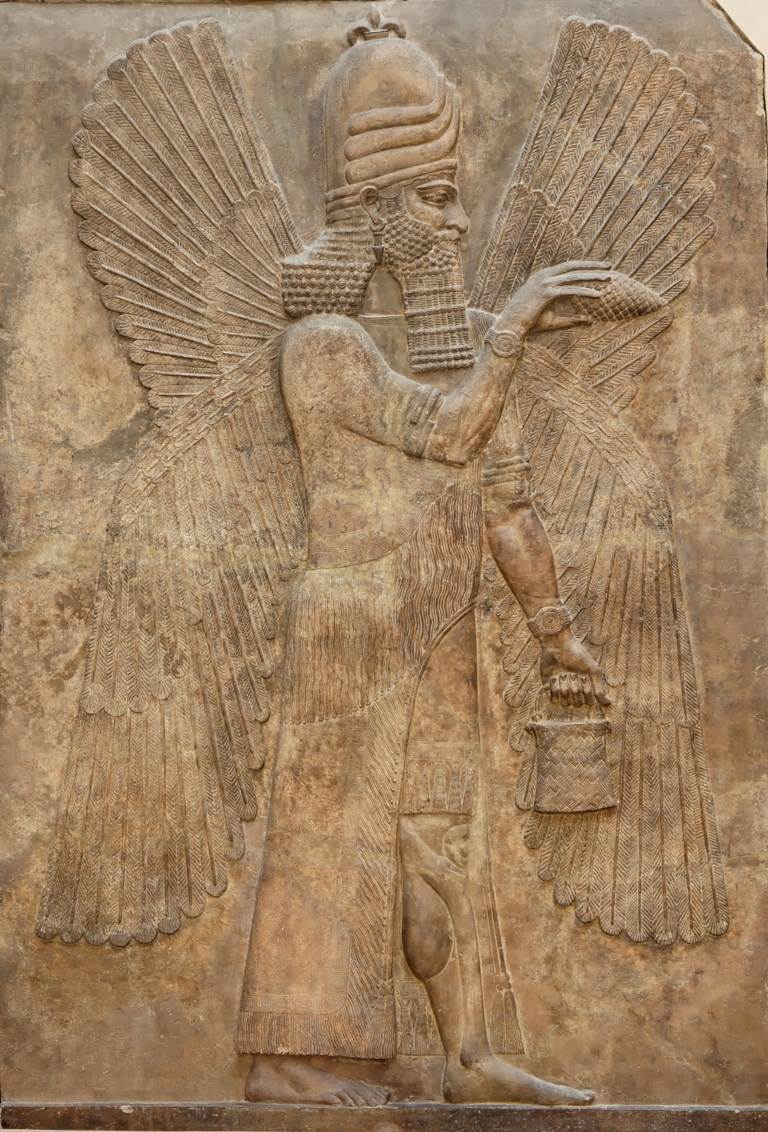
A relief from the North wall of the palace of King Sargon II depicting a winged deity.
“Therefore I make a decree, That every people, nation, and language, which speak anything amiss against the God of Shadrach, Meshach, and Abednego, shall be cut in pieces, and their houses shall be made a dunghill: because there is no other God that can deliver after this sort. Then the king promoted Shadrach, Meshach, and Abednego, in the province of Babylon,” as recorded in the book of Daniel.
Had King Nebuchadnezzar not been recognized as a god himself – by virtue of his allegiance and identification with Bel, the god of Babylon – he could not have made such a decree that exalted Jehovah of Israel above the god of Babylon. But by speaking that, he made a clear and specific decree that was issued from his throne and his position, and therefore could not be disputed.
The historian Josephus writes the following, “But let no one blame me for writing down everything of this nature, as I find it in our ancient books; for as to that matter, I have plainly assured those that think me defective in any such point, or complain of my management, and have told them in the beginning of this history, that I intended to do no more than translate the Hebrew books into the Greek language, and promised them to explain those facts, without adding anything to them of my own, or taking anything away from them.
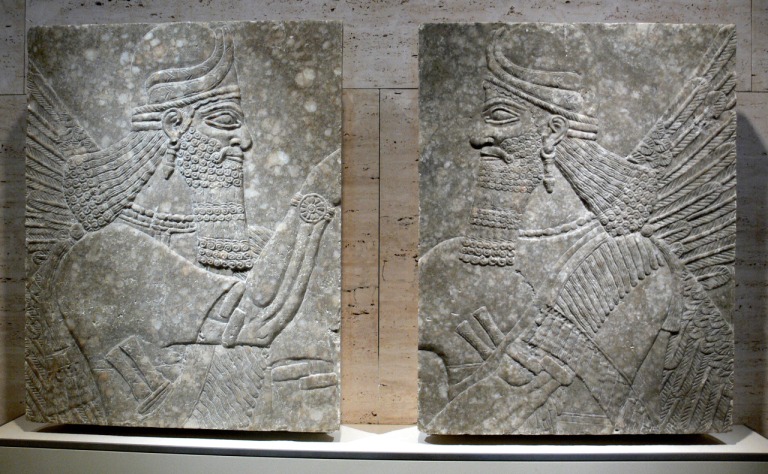
A pair of winged deity from the palace of Ashurnasirpal II
Through this disclaimer we that Josephus clearly reported what was recorded in the Hebrew Scripture, and what was viable and accurate historic records; and translated them into the Greek language, without any prejudice or opinion or change.
-THE KINGS TROUBLING DREAM-
Nebuchadnezzar was troubled by visions of a dream and called for his head magician, Daniel, to reveal the secret. Daniel chapter four records, “Therefore made I a decree bring in all the wise men of Babylon before me, that they might make known unto me the interpretation of the dream. The cam in the magicians, the astrologers, the Chaldeans, and the soothsayers: and I told the dream before them; but did not make known unto me the interpretation thereof. But at the last Daniel came in before me, whose name Belteshazzar, according to the name of my God, and in whom is the spirit of the holy gods: and before him I told the dream saying, O belteshazzar, master of the magicians, because I know that the spirit of the holy gods is in thee, and no secret troubleth thee, tell me the visions of my dream that I have seen, and the interpretation thereof.” The Holy Spirit was the Spirit of Daniel’s God. The words used here by the king regarding God were Elohim. It is a plural noun equivalent to the Hebrew Elohim.
Notice that Daniel was recognized as overseer of all the other master magicians. Daniel was regarded as being greater than all the learned men and religious devotees of his day. Daniel was not a magician or enchanter; his gift came directly from Jehovah Elohim. He was captive in Babylon even though he had been made a ruler. Daniel and his companions had proved their God and were made men of position; however, that position could be devastatingly ripped from them at any whim of Nebuchadnezzar. Jehovah Elohim was not slack regarding His promises. He had set watchers over the king, watchers are Holy Angels of God.
The other magicians were no doubt followers of Zoroaster, founder of the ancient Persian religion; and the wisdom of the Magi, who were originally a median tribe and were invested early with priestly rites. They guarded the sacred fire, recited hymns at dawn, and offered sacrifices. They had a reputation for magic arts, studied astrology, astronomy, and claimed to be able to do many things beyond human power, according to Dake.
Nebuchadnezzar shares this vision: “I saw visions of my head upon my bed, and, behold, a watcher and an holy one came down from heaven; He cried aloud, and said thus, Hew down the tree, and cut of his branches, shake off his leaves, and scatter his fruit: let the beasts get away from under it, and the fowls from his branches: Nevertheless leave the stump of his roots in the earth, even with a band of iron and brass, in the tender grass of the field; and let it be wet with the dew of heaven, and let his portion be with the beasts in the grass of the earth: Let this heart be changed from man’s, and let a beast’s heart be given unto him; and let seven times pass over him. This matter is by the decree of the watchers, and the demand by the word of the holy ones: to the intent that the living may know that the most High relueth in the kingdom of men, and giveth it to whomsoever he will, and setteth up over it the basest of men.” This dream came from a Holy Angel from Heaven at the command of watchers and holy ones, carrying out the will of the Most High. These watchers are reported to oversee the affairs of men to enable them to bring about the will of God on earth.
Daniel interpreted the dream, by the Spirit of God, saying that the king will be driven from his dwelling to eat grass like the ox, to be wet with the dew of heaven, and that seven years will pass until he knows that the Most High Rules.
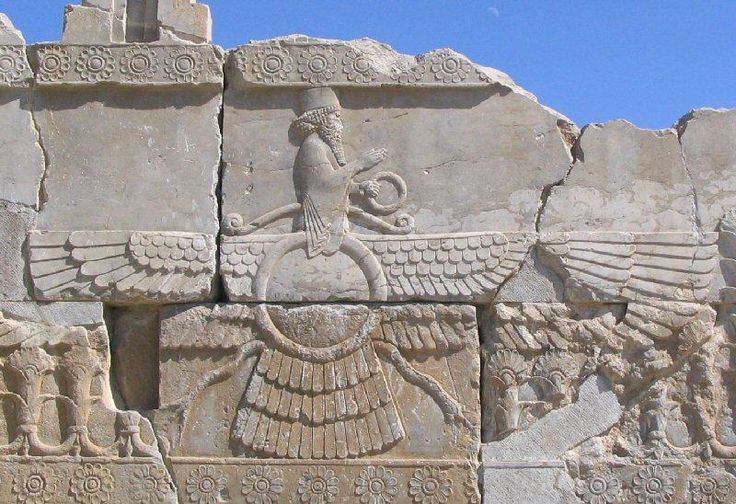
The Zoroastrian symbol of Ahura Mazda, known as the Faravahar. It was adapted by the Zoroastrians from the ancient symbol of the winged, horned sun disc.
This matter was declared as a decree by the holy watcher of God. Daniel proceeded to give Nebuchadnezzar God’s counsel; he advised the king to break off his sin and to show mercy on the poor that it may be lengthening of his tranquility. Daniel advised the king that if he would humble himself that this curse could be averted. According to the dream, this tree – its fruit and influence, its power, its reputation and its visibility – had reached the entire earth. As we have already referenced, antiquity acknowledges the feats and the accomplishments of this godlike king as exceeding the great accomplishments of Hercules, according to Josephus. At this height of rulership, Babylon and Nebuchadnezzar were “one.” Bel was recognized to the be the source of this superpower, and Babylon was one of the wonders of the world. The walls were impressive, the hanging gardens were magnificent, and the houses were built with precision. The beauty and the wealth of Babylon was splendid and compared to no other in superabundance.
One year later, after God had graced him with a twelve month period to correct his ways, the king looked upon his palace and his kingdom and said, “Is not this great Babylon, that I have built for the house of the kingdom, by the might of my power, and for the honour of my majesty?”
The king’s words gained this response, as recorded in the book of Daniel: “While the word was in the king’s mouth, there fell a voice from heaven saying, O king Nebuchadnezzar, to thee it is spoken; The kingdom is departed from thee. And they shall drive thee from men, and thy dwelling shall be with the beasts of the field: they shall make thee to eat grass as oxen, and seven times shall pass over thee, until thou know that most High ruleth in the kingdom of men, and giveth it to whomsoever he will.”
It is obvious that this voice from heaven was in response to a judgment that king Nebuchadnezzar deserved. He had been influenced by the false gods that ruled in Babylon to attribute his kingdom to Bel and not remember Daniel and the Lord. Nebuchadnezzar was lifted up in his own pride, and the pride of the Babylonian gods. In this kingdom as in many others before, the king and the god that empowered him became “one.” Nebuchadnezzar dropped on all fours and was driven into the fields possessed to resemble the very bull god that he worshipped. The king, his gods, and his kingdom are one, because the word of the king was law, and his religion was law.
There is a disease called Boanthropy: a psychological disorder which causes a human to think and act like a bull. The king was driven from men and ate grass as the ox. His body was wet with the dew of heaven. His hair grew like the hair of an eagle and his nails became like birds claws. We found the disease Boanthropy in the nineteen hundred and thirty-three version of the Shorter Oxford English Dictionary on Historical Principles.
The images on the gates and walls of Babylon represented the god of Nebuchadnezzar. They are the body of a bull and the head of the king. He was ascribed by historians as one of the greatest monarchs who ever lived. The Babylon of that time period is esteemed by the world as “a wonder.”
We have seen through our study men and women who became what they worshipped. Bel Merodach at the top of Babel is in the image of a bull. Great minds, great sovereigns, and even greater empires have fallen because of the worship of idols. We are speaking of the dark prince. He has taken possession of many names and companion images to shroud himself behind distorted myth and antiquities. Nebuchadnezzar became possessed with this bull god, and after seven years of behaving as one, he finally gave glory to Jehovah Elohim and was set free.
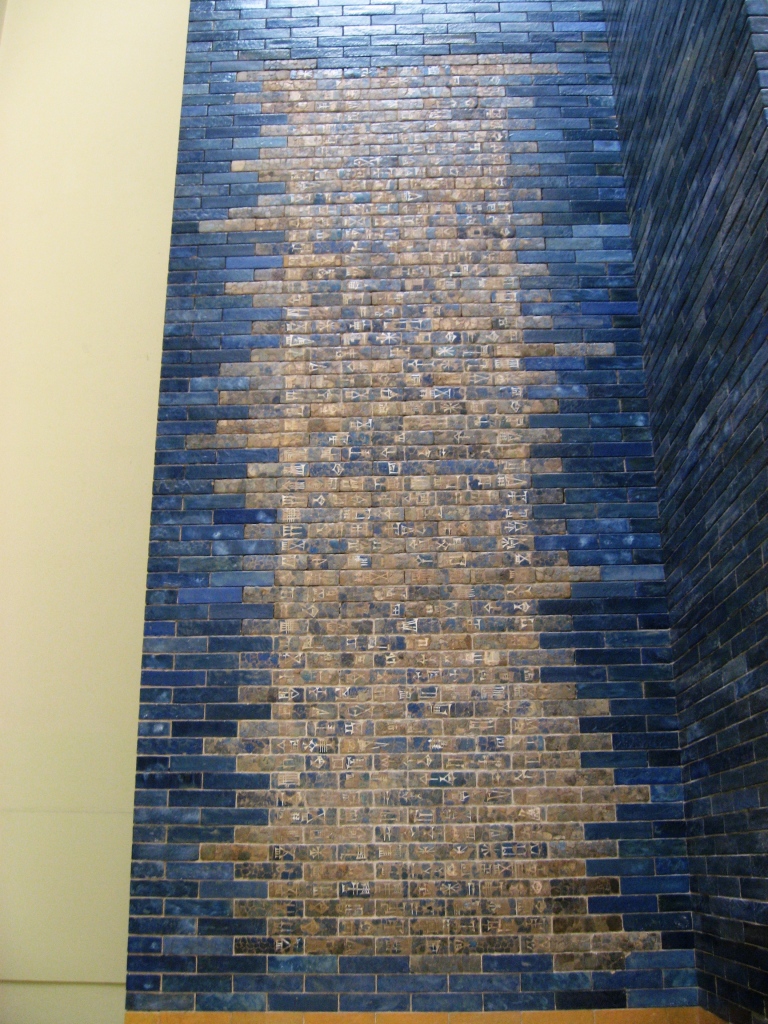
A large Cuneiform inscription from the King Nebuchadnezzar II placed on the Ishtar gate. It reads, “I Nebuchadnezzar laid the foundation of the gates down to the ground water lever and had them built out of pure blue stone. Upon the walls in the inner room of the gate are bulls and dragons and thus I magnificently adorned them with luxurious splendor for all mankind to behold in awe.”
The scripture describes it as this, “And at the end of the days I Nebuchadnezzar lifted up mine eyes unto heaven, and mine understanding returned unto me, and I blessed the most High, and I praised and honoured him that liveth forever, whose dominion is an everlasting dominion, and his kingdom is from generation to generation: And all the inhabitants of the earth are reputed as nothing: and he doeth according to his will in the army of heaven, and among the inhabitants of the earth; and none can stay his hand, or say unto him, W hat doest thou?”
